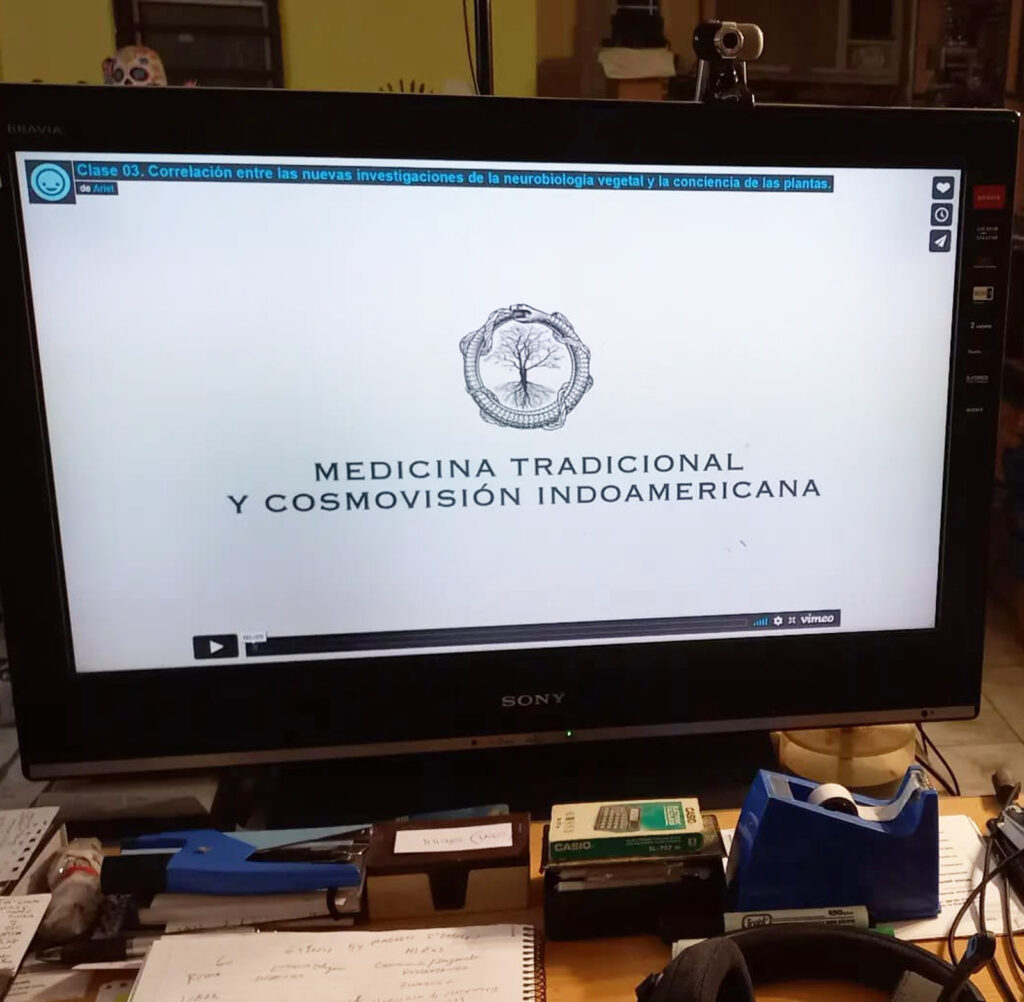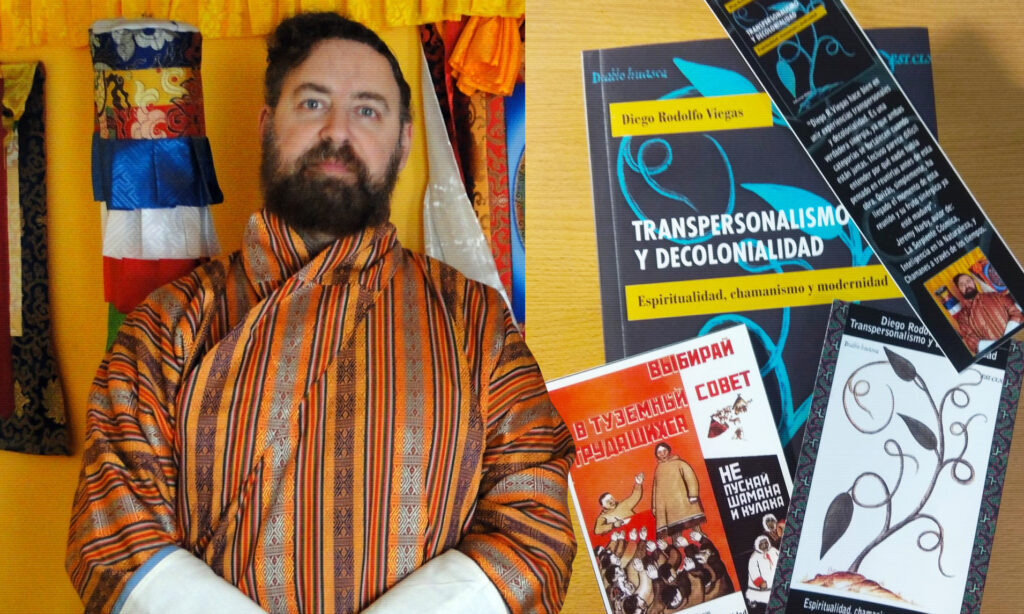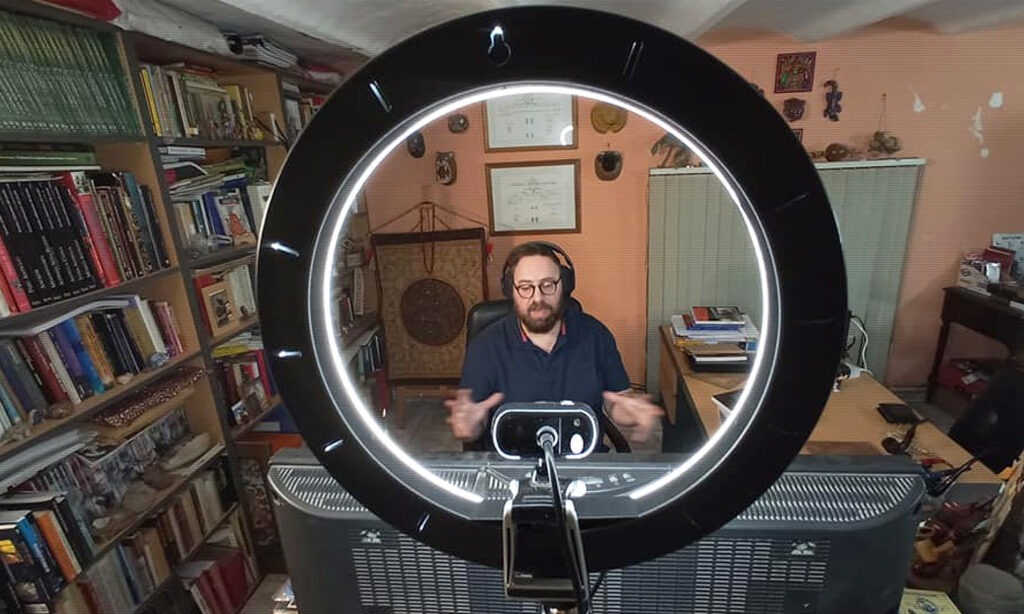The city has the first and only diploma in traditional medicine and shamanism in the country and Latin America. It is taught virtually at the Faculty of Humanities and Arts of the National University of Rosario (UNR) and has as its precedent its unprecedented face-to-face course for six years in the Pathological Anatomy classroom of the Faculty of Medicine, when attendees from different countries, the subtle sound of the water sticks of a Guarani shaman showing his trade, transported them to the depth of nature, to the essence of the master plants and to unite the human dimension, compartmentalized since modernity.
“Today we welcomed our 30 students from the new Diploma in Advanced Studies in Traditional Medicine and Indo-American Worldview of the Faculty of Humanities and Arts. The virtual platform and the first class were inaugurated. Much enthusiasm and interest in those enrolled from all over the country and from Chile, Colombia, Guatemala and Brazil who are joining us this academic year”, its coordinator, cultural anthropologist Diego Rodolfo Viegas, wrote on social networks at the beginning of the course.
Viegas, who is also a lawyer, teaches the chair of Ethnography of Knowledge in the Humanities, directs the Center for Studies in Anthropology of Knowledge and Consciousness, and the academic journal Uaipo Nem (Spiritual Messenger in Chaná language). He was a professor in the master’s program in Cultural Studies at the National University of Tres de Febrero (UNTREF) and is a professor at the Rosario School of Museology, and outside the academy he is a member of the Mesa Verde Foundation and the radio program “La Grieta de the Uncreated”, in both cases together with the psychiatrist and psychotherapist Néstor Berlanga and Ariel Roldán, respectively, and the psychologist Iván Turchetti.
“It is not superfluous to state that all our activities have nothing to do with the new age mercantilist and recolonizer, which invents courses online or for a weekend, to be a shaman or to offer experiences”, explained Viegas. And he emphasized to leave no doubts: “all that blackmail is exactly the opposite of our proposal.”
In one of its latest editions, the radio program, which is broadcast on Wox 88.3 and simultaneously on Facebook and YouTube, focused on “Transpersonalism and Decoloniality”, two academic currents that coincide in rethinking the canonical ways of knowing and in destructuring common sense coined by rationalist paradigms.
A not-so-new field of study
Is transpersonal or consciousness anthropology a new field of study? “It is for Latin America, but not for the United States where he has been for forty years and is a member of the American Anthropological Association,” says Viegas. And he lists his concerns: he deals with the study of the psychological and sociocultural aspects of transpersonal experiences, of the relationship between consciousness and culture, and rediscovers the relevance of systems of knowledge, therapy and spirituality based on Expanded States of Consciousness (EAC). ).
“The transpersonal is defined as experiences that lead beyond self-consciousness, which can be obtained with different techniques such as meditation, yoga, traditional psychoactive plants, deep contemplation, extreme heat or cold, and ecstatic dances, among other tools. and traditional practices, from different religions, worldviews, civilizations and cultures”, he explains. And he clarifies that it is about expanded states of consciousness and not altered, like the one that would produce a drunkenness.
According to Viegas, expanded states of consciousness have been used since ancient times to obtain information. “It’s about ways of obtaining knowledge, that’s what the subject I teach is about, other ways of knowing such as myth, ritual and sacred geography, beyond Western science that is about 500 years old,” he said. And he said that precisely because it is established as a unique model, it believes it has the power to legitimize or not other paths.
“The fact is that expanded states of consciousness existed and exist as a form of knowledge and only now, with the anthropology of consciousness, is the veil beginning to be lifted with the utmost seriousness, getting involved to feel the same as the subjects of study to understand them more deeply,” he assured. And he gave examples: in a dance they use a mask to represent the ancestors, you have to put on the mask and dance, the same if it is an ayahuasca ceremony, you will have to take it and risk getting into an experience that is not at all pleasant, extremely deep , in which the body and mind are put at risk, to understand what is going through the mind of the shaman, although a single shot is far from what a shaman who has years of training and who knows mental maps can perceive in which it is immersed, ”he explained. In this framework he cited anthropologists such as Michael Harner and Michael Winkelman.
“The fact is that expanded states of consciousness existed and exist as a form of knowledge and only now, with the anthropology of consciousness, is the veil beginning to be lifted with the utmost seriousness”
What kind of knowledge is it? Of practical knowledge, for example for healing and diagnosis, says the anthropologist. And he clarifies that for thousands of years, in Africa or the Amazon, these expanded states of consciousness were used to reach a diagnosis of different types of illnesses, which included psychological and spiritual factors, a dimension that was left aside when Western medicine established their paradigms.
“It is a comprehensive and complex look, it sees the somatic, but also the psychological and spiritual aspect. The original peoples considered the disease as an imbalance that had to be harmonized to recover health, which could also be broken by the social environment such as not respecting a taboo, the family, the environment, the clan, nature or the cosmos”, he explains. Viegas. A vision that exceeds the Western conception of health-disease, although now there is also talk of psychosomatic medicine and psychoneuroendocrinoimmunology, “from which it is a matter of reintegrating the aspects that positivism cut into different pieces,” he emphasized.
“We are just coming out of the old paradigm of modernity, which was forged from the scientific revolution and the development of capitalism, and that Eurocentrism led to the entire planet through colonization, often with violence, and that made many of these comprehensive worldviews have disappeared, with processes of ethnocide (death of culture) and epistemicide (the destruction of knowledge for being different”, he argued.


prejudices in the head
“As the anthropologist and epistemologist Ana María Llamazares says, the prejudices of the modern Western paradigm are in our heads, it is about common sense, which of course something cracked with quantum and relativistic physics, with the general theory of systems, among others. others,” he commented. And he said that one of the fathers of transpersonal anthropology, Charles Laughlin, from the University of Ottawa, Canada, who prefaced two of his books, considers that Western culture is “monophasic, because it validates only one state of consciousness, that of wakefulness and with an emphasis on logic, rationalism, objectivism, in contrast to traditional societies that are or have been polyphasic, that is to say that they accompanied empirical knowledge with symbolic-magical thought, validating the integration of more than one state of consciousness. conscience,” he explained. And she said that many myths and theophanies, which were always investigated as mere symbols, abstractions, were actually experiences in expanded states of consciousness.
“Medicine, philosophy, religion, mythology have in common their deepest roots in expanded states of consciousness, which have always been regulated and highly regulated; there is evidence and traces in the most varied archaeological sites such as Teotihuacán (Mexico), Chavín de Huantar (Peru), Tiwanaku (Bolivia) and Eleusis (Greece) where expanded states of consciousness were shared”, he assured.
Paths to hierarchize and decolonize
For Viegas, the anthropology of consciousness is a kind of little sister of the anthropology of knowledge and is not as developed. In favor of hierarchizing it, the Center for Studies of Anthropology of Knowledge and Consciousness emerged, and the edition as its official organ of the academic journal Uaipo Nem, a title that refers to our region, as suggested by the anthropologist David Ávila. It is an annual publication, carefully edited, which comes out next July with authors such as Jeffrey Kripa, from Rice University (Houston-Texas), who studies “frontier issues in science.” In addition to academic activities, Viegas is a member of the Mesa Verde Foundation, a space that has been disseminating the subject to the general public for 25 years, as the radio show “with a phenomenal response, with a lot of data about the mysteries of culture, society, reality and consciousness, to which we put a little humor”.

Spirituality and shamanism: how to validate other forms of knowledge beyond western science

